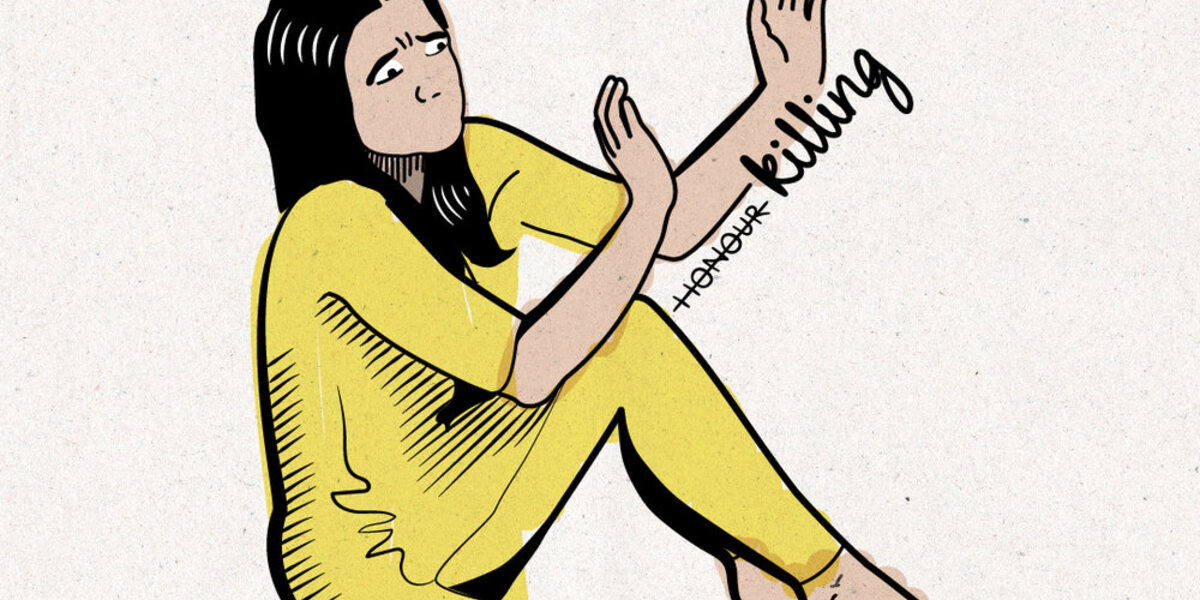
Honour Killings are a social phenomenon which one would expect to be done away with in this modern society which has developed far more complex issues. The fact that our society still feeds the male ego, which is built on delusions, is deeply concerning, and this acts as a roadblock for liberal thinking. Honour in this essay’s context has two approaches. On one side, we value honour as respect for ourselves, and on the other, if the society would accept this self-respect or not, and if we would be able to reap the benefits accorded with it[1]. Honour killings occur when a person transgresses community norms, and they are murdered to preserve the culturally prescribed honour[2]. Honour killings can also be expressed as a punishment for freely exercising your fundamental right to personal liberty and constitutional privacy[3]. The British Raj sympathised with the men if someone had intercourse with their daughter, wife, or sister. The man could kill the person who had intercourse, and he would be held liable for manslaughter, and not murder. This is one of the historical causes which gave the perpetrators of this crime a free pass.
The reason why females are murdered by their family members, is because it is believed that the reputation and social standing of a family, or a community, is based on the conduct and morality of the women[4]. Honour is thought to reside primarily, but not exclusively, in the bodies of women. Historically, public spaces have been regarded as male dominated spheres[5]. Male dominance is exerted in these spheres by means of executing public murders of women who have tried to seek inclusivity from them. Women who have ‘dared’ to make a choice are victims of violence. If a girl chooses to have sexual relations with a man of her choice, or chooses to marry someone without the consent of her community, the honour of the man of the family is at stake and the only recourse available to him is murder. Apart from the women, if a man has consensual intercourse with a married woman, the husband must kill the man to protect the honour of his family. The disturbing aspect of this is the fact that the murders are committed by the family of the victim, who stand in a position of trust vis-à-vis the victim[6].
Women become the victims of violence and murder due to a multitude of reasons. These include defying dress codes, meeting men not related to her, disobeying the men in the family, et cetera. But usually, these actions are not the prime causes of honour killings. These lead to severe violence against them, but the driving cause of the murders are related to marriage and sexuality. Even acts like rape, can lead to killing of the victim. A mere suspicion of these acts is enough for the men to be triggered and commit murders.
A sociological insight to why the men of the families assume a responsibility and establish a position of power over the women is explained in “The customary law of the Rohtak district”. It states that a woman, whether a minor or an adult, is always under guardianship. When she is single, it’s under the father, and passes on to the brother if the father is incapable. After she is married, her husband takes over the guardianship, which is passed on to her sons when the husband dies[7]. This is why the men of such families feel no bar upon their behaviour with women. They are treated as disposable commodities, and social institutions like child marriage encourage this.
In traditional patriarchal societies, inheritance is patrilineal. Moreover, the family or community, and not the individual, is the basic social, economic, and political unit[8]. Looking at honour killings from a sociological perspective, when a woman marries to a person of lower caste she goes into the husband’s caste, this brings the family’s status down in the eyes of society. Patriarchal tradition casts the male as the sole protector of the female so he must have total control of her. If this protection is violated, he loses honour because he failed to protect her[9]. This is why either the father or the brother, or other men belonging to the community take it upon themselves to execute such killings. Apart from this, social facts like dowry establish a direct causal link to crimes against women like female infanticide and sex selected abortions. These further motivate and provide the man with a social backing to carry out such murders.
Honour killings are usually performed by the Khap Panchayats of states like Haryana, Uttar Pradesh, Punjab and Bihar, and Katta Panchayats of Tamil Nadu. These institutions have evolved to be non-state parallel adjudicators, and their notions of social constructs conflict with independent notions like gender and sexuality[10]. Ethnographic research has shown that these panchayats legitimize their presence by ‘safeguarding’ family honour[11]. They are deeply involved in the decision making of the families, and thus enjoy considerable power and control over them.
In India, the institution of marriage and the idea of choice is not individual as much as it is social. Marriage is certainly not a trivial affair in India[12]. People get married for various reasons, like, carrying forward the bloodline, property rights, and even, in rare cases, out of love. Marriage for men is linked to reproduction, masculinity, and control over the family, whereas, for women, it is linked to safeguarding the sexuality and protecting the family honour[13]. The law allows for intra-gotra marriage and inter-caste marriage, but the self-proclaimed parallel executors of law denounce this. The prevalence of clan exogamy has led to suicides by people who have been subject to torture by the Khaps[14]. They are also made to tie a rakhi (sacred string), which bonds them into a sibling relationship.
It’s important to take note of the fact that these killings mainly take place between backward communities like the Jatts of Haryana, the Jat-Sikhs of Panjab, and the Rajputs of Rajasthan[15]. These communities reside in the rural segments and are vastly illiterate, still pursuing their tribal, ethno-community based socio-cultural value system. Egalitarianism in caste, community and gender has not been accepted as a part of their socio-cultural phenomena. Such communities remain untouched by social, political, legal, and cultural modernization, and honour killings remains a prestigious tool in their culture. Honour killings, therefore, are not just a gender-specific social phenomena. It has become a psychological instinct installed in the minds of the men.
The states where these killings take place are an example of the cruel orthodoxy and cognitive blindness. States like Haryana and Panjab, which are economically developed states have failed to catch up on social maturity, as expressed through the increasing spike in the rates[16] of honour killings by kangaroo panchayats. It is important to note that the executors of such killings do not have any criminal or anti-social profiles. The accused often comprises of educated employees whose family has no criminal background.
Owing to do the semi-tribal social and cultural living conditions in the states of Haryana and Panjab, the village demographic is arranged in way where people belonging only to the same caste, and the same gotra live together. This is why, the primary cause of honour killings is intra-gotra and inter-caste marriage or sexual relations between people. Therefore, the notion of marrying within the village is problematic for the Khap panchayats. Another significant cause is marrying a person who does not belong to your gotra but belongs to your caste, but the families of either ones do not approve of sexual or matrimonial relations between them. Other causes include a woman denying to perform sati for her deceased husband, and a widow having a relationship with another man. Quite often, if a couple elopes from the village, a fake killing is orchestrated to ‘protect the honour’ of the family, and sometimes the identities of such households were concealed to avoid defamation.
In studies conducted by Satnam Singh Deol[17] (2014) on the occurrences of honour killings in the states of Haryana and Panjab, it is noted that in only 10-12% of the cases, the boy is killed for his acts. It is the woman who is usually the victim. One reason for this is that the family believes that murdering the girl secretly would conceal the girl’s relationship with the boy. Killing the boy would draw unnecessary attention towards the family. Another reason is that the girl’s family would not like to make the boy’s family hostile towards them. In order to protect the family from profanities, usually only the girl is killed. That being said, it does not mean that men are immune to honour killings. In order to paint a picture of the boy deluding and immoralizing the girl, the girl’s family might kill the boy instead of the girl. Even in cases where the girl belongs to a higher cast than the boy, it is the boy who is killed.
Deol also found how the families of the women are affiliated with their killings. In near 70% cases, the father is directly involved. He might not swing the sword in all cases, but he has knowledge of the actions taken by the community against his child. Honour killings are usually organized incidents and are carried forward on the consent of the father. Involvement of the mother varies from 3% in Haryana to 12% in Panjab. Numerous incidents have been reported where the families have appointed contract killers for the eloped couple. This is deeply problematic as the family will go the extra mile to protect their ‘honour’, at the cost of their blood. This might be an example of Durkheim’s theory of mechanical solidarity[18]. The collective conscience of the community does not leave any space for the family to assert their own will.
The imposition of the adherence to specific orthodox practices in the name of culture by the panchayats, is not just an attack on the concerned individual, but an attack on the institution of free will and choice. Honour killings are a manifestation of the friction between cultural relativism and universalism[19]. It shows a direct contrast between the liberal notion of individual agency, and the conservative notion of collective social agency. The panchayats do not question the marriage, but the exercise of the free will of choosing whom to marry.
An attack on the malpractice of honour killing is translated into an attack on culture. Therefore, there have been issues in order to implement the methodological prevention of honour killings. The argument of cultural relativism is raised which acts as a hinderance towards the prevention. The solution to this issue of cultural relativism of rights can be resolved through a proposal of a “universal right to difference”[20]. This argument of cultural relativism in terms of honour killings would be deemed invalid by the constitutional protection of cultural rights. However, the primary objective should be to change the mindset of the bigoted societies to be tolerant of the women’s choices.
To conclude, in the present day, it can be seen that our country is making an effort to portray itself as a bit more acknowledging of the serious issue of honour killings. India has come a long way from pardoning Dara Singh for the murder of Graham Staines and his two children, to successfully passing the Prohibition of Interference with the Freedom of Matrimonial Alliances in the name of Honour and Tradition Bill, 2019 in Rajasthan which supposedly allows for death penalty in cases of honour killings. However, no action has been taken against 16-year-old Rinku’s mother, who burned her alive in Rajasthan’s Pali District for eloping with a man [21]. Thus, I believe we still have a long way to go if we need to free our country from social evils like honour killings.
About the Author
Aryan Tulsyan is a first year student, reading law at Jindal Global Law School
Bibliography
- Ahlawat, Neerja. 2015. “Marriage Norms, Personal Choices, and Social Sanctions in Haryana” Sociological Bulletin: 91-103.
- Annavarapu, Sneha. 2013. “Human Rights, Honour Killings and the Indian Law: Scope for a ‘Right to Have Rights’”. Economic and Political Weekly: 129-135.
- Bhatia, Alka. 2012. “Honour Killing- A Study of the Causes and Remedies in its Socio Legal Aspect” International Indexed & Referred Research Journal: 38.
- Brandon, James, and Salam Hafez. 2010. Introduction. In Crimes of the Community: Honour-Based Violence in the UK. Centre for Social Cohesion.
- Chandrachud, Abhinav. 2011. “Inconsistent Death Sentencing in India”. Economic and Political Weekly: 20-23.
- Chapman, Jean. 2014. “Violence against Women in Democratic India: Let’s Talk Misogyny.” Social Scientist: 49-61.
- Deol, Satnam Singh. 2014. “Honour Killings in Haryana State, India: A Content Analysis”. Official Journal of the South Asian Society of Criminology and Victimology: 192-208.
- Deol, Satnam Singh. 2014. “Honour Killings in India: A Study of the Punjab State”. International Research Journal of Social Sciences: 7-16.
- Durkheim, Émile. 1984. Mechanical Solidarity, or Solidarity by Similarities. The Division of Labour in Society: 31-67.
- Joseph, Eustache. 1911. “Customary law of the Rohtak District.” Punjab Customary Law Volume 23: 54-55.
- “Rajasthan ‘Honor Killing’: Mother, Uncle Murder 16-Year-Old Girl over Love Affair; Arrested.” 2020. Crime News. Accessed November 18. https://www.timesnownews.com/mirror-now/crime/article/rajasthan-honor-killing-mother-uncle-murder-16-year-old-girl-over-love-affair-arrested/586085.
- Sharma, Kanhaya. 2012. “Is there Today Caste System or there is only Caste in India?” Polish Sociological Review: 245-263.
- Turner, Terrance. 1997. “Human Rights, Human Difference: Anthropology’s Contribution to an Emancipatory Cultural Politics.” Journal of Anthropological Research, 53: 273-291
-
Sharma, Kanhaya. 2012. “Is there Today Caste System or there is only Caste in India?” Polish Sociological Review: 245-263 ↑
-
Supra note 4. ↑
-
Id. ↑
-
Deol, Satnam Singh. 2014. “Honour Killings in Haryana State, India: A Content Analysis”. Official Journal of the South Asian Society of Criminology and Victimology: 192-208. ↑
-
Durkheim, Émile. 1984. Mechanical Solidarity, or Solidarity by Similarities. The Division of Labour in Society: 31-67 ↑
-
Supra note 2. ↑
-
Turner, Terrance. 1997. “Human Rights, Human Difference: Anthropology’s Contribution to an Emancipatory Cultural Politics.” Journal of Anthropological Research, 53: 273-291 ↑
-
“Rajasthan ‘Honor Killing’: Mother, Uncle Murder 16-Year-Old Girl over Love Affair; Arrested.” 2020. Crime News. Accessed November 18. https://www.timesnownews.com/mirror-now/crime/article/rajasthan-honor-killing-mother-uncle-murder-16-year-old-girl-over-love-affair-arrested/586085. ↑





Fantastic beat ! I wish to apprentice while you amend your web site, how could i subscribe for a weblog web
site? The account aided me a appropriate deal. I were a
little bit acquainted of this your broadcast offered
vibrant transparent concept
Hi there! I’m at work surfing around your blog from my new iphone 4! Just wanted to say I love reading through your blog and look forward to all your posts! Carry on the superb work!
I know this website offers quality dependent articles or reviews and other stuff, is there any
other web site which offers such information in quality?
Thank you ever so for you article post. Great.
It is perfect time to make some plans for the longer term and it’s time to be
happy. I’ve read this submit and if I could I desire to suggest you some interesting issues or suggestions.
Maybe you can write subsequent articles relating to this article.
I desire to read more things about it!